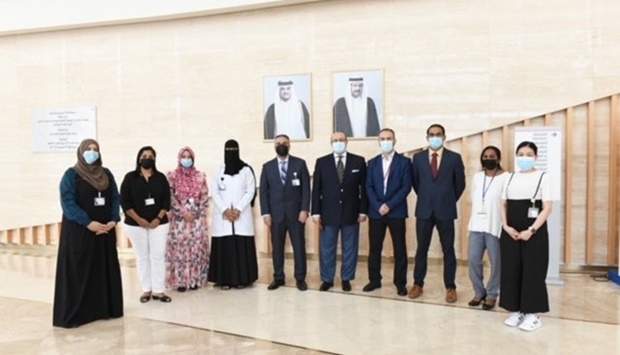The Neonatal Intensive Care Unit of Women’s Wellness and Research Centre has observed International Neonatal Therapy Week from 18 to 24 September to celebrate the contributions of neonatal occupational and physical therapists across the globe.
The observance of the week is supported by National Association of Neonatal Therapists (NANT) - an organisation that serves neonatal occupational therapists, physical therapists, and speech-language pathologists in Qatar. According to NANT, neonatal therapy is the art and science of integrating typical development of the infant and family into the environment of the NICU.
Activities during the week included a half-day symposium where external speakers Emily Hills (OT) and Lindsay Hardy (OT) presented a webinar titled, “Sensory Beginnings and Beginning Early-How Sensations Can Help or Hinder Life in the Neonatal Unit”. There will also be a presentation on the topic – “Current evidences on neurodevelopmental outcomes of late preterm infants” by NICU therapists. Around 100 participants across different disciplines in Hamad Medical Corporation are expected to attend the webinar.
Throughout the week, awareness roll-ups and posters will be displayed at different locations across WWRC, and fun educational activities will be held in NICU and postnatal (PN) wards with healthcare professionals for their awareness and engagement. There will also be an information booth set up for parents and families where they can engage and learn about various age appropriate activities for their children.
“In the NICU, occupational therapists and physiotherapists nurture the development of preterm neonates via integrated, individualised, neuroprotective, and therapeutic interventions. And as neonatal therapists, we use our specialised education and training to support optimal short and long-term development of preterm babies. We prevent or mitigate adverse sequelae and nurture the infant-family connection. We do our best to bridge the developmental gap from the expected environment of the womb to the unexpected and unpredictable environment of the NICU,” says Dr. Hilal Al Rifai, Chief Executive Officer and Medical Director of WWRC.
Stressing the importance of integrating neonate’s developmental care and family with the NICU environment, Dr. Mai Abdulla Al Qubaisi, Acting Director of NICU, WWRC states, “Parental involvement is essential and beneficial both for the baby and the mother. More parental visits are linked to less parental and baby stress, enhanced mother-child bonding, decreased separation anxiety, more milk supply leading to better weight gain for the baby, better understanding and confidence among parents to take care of the preterm baby.”
She notes further that parents’ engagement in the NICU helps to decrease emotional and behavioural problems in child’s later life. It also promotes better tone and neurodevelopment, decreases pain, hypoglycemia, hypothermia, and readmissions.
Sultan Salim Hammam Al Abdullah, Head of Occupational Therapy, HMC explains that occupational therapists play a vital role in the NICU by incorporating age-appropriate feeding techniques to feed preterm babies safely and efficiently. “Occupational therapists also educate nurses and parents in understanding their babies’ cues while ensuring that babies are fed safely in the NICU and at home. These strategies help in the babies’ neuro behavioral organisation, nurturing their immature sensory systems while also improving family attachment and bonding,” he notes.
Noora Rashid Al Mudahka, Chief of Physiotherapy, HMC adds: “Physiotherapists assess babies’ movements and suggest strategies to optimise their neuromotor development. Physiotherapists nurture infants’ immature musculoskeletal system by providing them with individualized, therapeutic as well as neuroprotective interventions. They also educate nurses and parents in understanding their babies’ strengths, and areas where they can support to optimize their babies neuromotor development.”
Upon discharge from the NICU, the preterm babies are screened in follow-up clinics to identify concerns in their development and the need to refer for appropriate therapy services if required. WWRC has two follow-up clinics namely Baby Therapy Clinic (which follows babies born at 30+1 to 36+6 weeks of gestation until they are one-year-old) and Neonatal Neurodevelopmental Clinic that follows extreme preterm babies born from 23+0 to 30+0 weeks of gestation until they are two-years-old.

